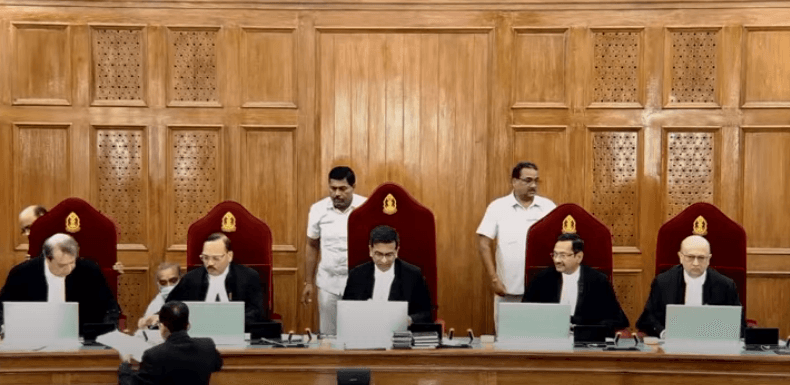Supreme Court Upheld the constitutional validity of Section 6A of Citizen act of 1955, that grants citizenship to the immigrants who entered Assam between January 1, 1966 to March 25, 1971.
The judgment passed by five-judge Constitution Bench, including Chief Justice DY Chandrachud and Justices Surya Kant, MM Sundresh, JB Pardiwala, and Manoj Misra. Justice Pardiwala give dissenting judgement, by finding Section 6A unconstitutional with prospective effect. So, 4:1 voted in majority, upholding the constitutional validity of Section 6A.
CJI DY Chandrachud said that the Assam Accord was a political solution to the problem of illegal migration after creating Bangladesh and Section 6A was a legislative solution. The majority judge verdicts also held that the cut-off date of March 25, 1971 was a rational, as it was the date of Bangladesh liberation war.
Assam’s Unique Treatment Based on Immigrant Proportions
The majority of judges decided that it was fair to treat Assam differently from other states that share larger borders with Bangladesh. This is because the ratio of immigrants to the local population in Assam is higher than in those other states. The impact of 40 lakh migrants in Assam is greater than that of 57 lakh migrants in West Bengal, primarily due to Assam’s smaller land area.

March 25, 1971, as the Cut-off Date for Citizenship
Moreover, the majority held that March 25, 1971, as the valid cut-off date for citizenship claims, as it coincided with the end of the Bangladesh Liberation War.
Justice Surya Kant in the majority said that Section 6A is “neither over-inclusive nor under-inclusive,” thus supporting its constitutionality.
He also stated that those who have entered Assam from Bangladesh after the cut off date of March 25, 1971, are declared as illegal immigrants and thus Section 6A is irrelevant for them.
He also said, “Though we’ve upheld the validity of 6A, there is a lack of implementation which may cause injustice to many.”
Justice Pardiwala, in his dissenting opinion, said, “Section 6A may be valid at the time of enactment but by afflux of time, it has become temporarily flawed,” adding, “Section 6A was enacted to give legislative recognition to the political settlement.”
There is no valid reason to argue that Section 6A violates the principle of fraternity
Justice Surya Kant in his judgement (for himself, Justices Sundresh and Manoj Misra) rejected the petitioners’ claim that Section 6A violated the principle of fraternity in the Constitution’s Preamble. He explained that fraternity shouldn’t be interpreted narrowly, as it doesn’t mean people can choose their neighbors.
Chief Justice Chandrachud noted in his judgment that just having different ethnic groups in a state doesn’t mean the fundamental right to protect language and culture under Article 29(1) of the Constitution has been violated. The petitioners must show that one ethnic group is unable to preserve its language and culture solely because of the presence of another group.
Regarding the argument of the petitioners based on Article 29, Justice Surya Kant, in his judgment, stated that the petitioners were unable to prove that immigration had harmed Assamese culture and language under Article 29. In fact, Section 6A requires that migrants who entered after the cut-off date be detained and deported. The judgment also rejected the argument that Article 21 was violated, as the petitioners couldn’t show any valid impact on their culture caused by the presence of another group.
The Section 6A of Citizen Act
Section 6A was enacted as part of Citizen Amendment Act, 1985, following the Assam Accord, 1985. This act grants foreign migrants of Indian Origin who entered Assam between January 1, 1966 and March 25, 1971 to apply for Indian citizenship.
The Assam Accord was an agreement between the Central Government, the Assam State Government, and leaders of the Assam Movement, aimed at stopping the flow of illegal migrants from Bangladesh. This Assam Accord signed in 1985 and introduces Section 6A of 1955 into citizenship Act, exclusively in Assam.
Justice Kant read out the following conclusions regarding Section 6A :
1. Immigrants who entered Assam before the date of January 1, 1966, are deemed to be Indian citizens.
2. Immigrants who entered Assam between the dates January 1, 1966, and March 25, 1971, are entitled to seek Indian citizenship provided they fulfil the eligibility criteria.
3. Immigrants who entered Assam on or after March 25, 1971, are declared to be illegal immigrants and are liable to be detected, detained and deported.
Case Background and Progression
The Assam Sanmilita Mahasangha, a civil society organization, challenged Section 6A for the first time in 2012, claiming it was discriminatory. They argued that having different cut-off dates for recognizing illegal migrants in Assam compared to other parts of India was unfair.
In 2014, a two-judge bench referred the case to a Constitution Bench, which was established on April 19, 2017. The bench has changed several times due to retirements, leading to the current group of judges. The hearings for the case began on December 5 and concluded on December 12, 2023, with the judgment announced today.


